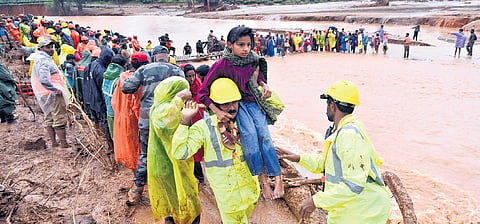

KOCHI: Learning lessons from Wayanad, a move is underway to establish rain gauges at over 100-300 locations, and several weather stations in Idukki, which is also a big landslide-prone district in Kerala. The move is to help evacuate people to safer places based on the rainfall data and micro-weather forecast, if it points to a landslide threat.
The move was initiated by Vandanmedu-based Cardamom Planters Federation, which has over 300 planters as members with a presence across the hill district from Kallar near Munnar to Vandiperiyar. The government has just one weather station in Idukki -- at Kerala Agricultural University’s Cardamom Research Station, Pampadumpara, and another 3-4 rain gauges.
“Our members already have rain gauges in their plantations across the district. In addition, a few of them also have weather stations, which will give the information of all key aspects including rainfall measurements, wind speed, cloud cover, and during summer, the ultraviolet radiation, the heat, the temperature, etc.,” said Stany Pothen, chairman of the Cardamom Planters Federation.
The cost of a rain gauge is as low as Rs 700-1,500, and a private weather station costs around Rs 15,000. “Even a small farmer can afford to set up a rain gauge, and monitor the data,” he said. While a couple of Federation members have their own weather stations, another 3-4 planters are keen to set up weather stations at their plantations.
The idea is to provide the rainfall data every morning in a WhatsApp group monitored by the district disaster management cell from all parts of the region, helping the authorities to provide alerts to people, where there are high chances of landslides. In August 2020, a massive landslide in Pettimudi, a hamlet in Idukki, triggered by heavy rainfall (616 mm in 24 hours) crushed a settlement of tea estate workers, killing over 60 people.
Early this week, Zachariah Njavellil, a planter and member of the Federation, met Idukki District Collector V Vigneshwari and proposed the cardamom planters’ willingness to provide the rainfall data to the district disaster management cell on a daily basis, and even at shorter intervals during heavy rainfall periods.
"We need to act fast as we can expect big landslides in Idukki during August. There is no point in giving ‘red’ and ‘orange’ alerts to the entire districts when we can minutely analyse data based on the rainfall, and evacuate people in the event of extreme rainfall from a particular location,” Njavellil said, adding that the Collector was favourable to the idea.
Federation chairman Pothen said the existing rain gauges of the district administration and NGOs are located on the dam sites or near the banks of rivers. “This will not help in forecasting the impact of heavy rainfall and the event of landslides,” said Pothen, pointing out that Mundakkai, which was the epicentre of landslides in Wayanad, received 572 mm rainfall in 48 hours.
Vigneshwari could not be contacted for comments but an officer in the Idukki Collector’s office told TNIE that the district administration was discussing the proposal. “A cardamom planter, who is also a member of our Federation, along with his workers, moved out from his property in Wayanad, based on the rainfall data from his private weather station,” said Njavellil.
In Idukki’s high ranges, Chennai-based M S Swaminathan Research Foundation (MSSRF) along with Equinoct, a Kochi-based non-profit, is also setting up rain gauges to help the local residents from monsoon-related devastations. “They are setting up one rain gauge in every panchayat in the district,” said Sibi Thomas, convenor of the disaster manager cell at Inter-Agency Group (ICG) under the Idukki Collector.
While the big cardamom planters can analyse the data on their own and protect themselves, this is not the case with small farmers, who live on steep hills, which are highly prone to landslides. “I have met the Idukki bishop and sought the Church’s help in setting up rain gauges in the churches and Church-run schools in the district,” said Njavellil.